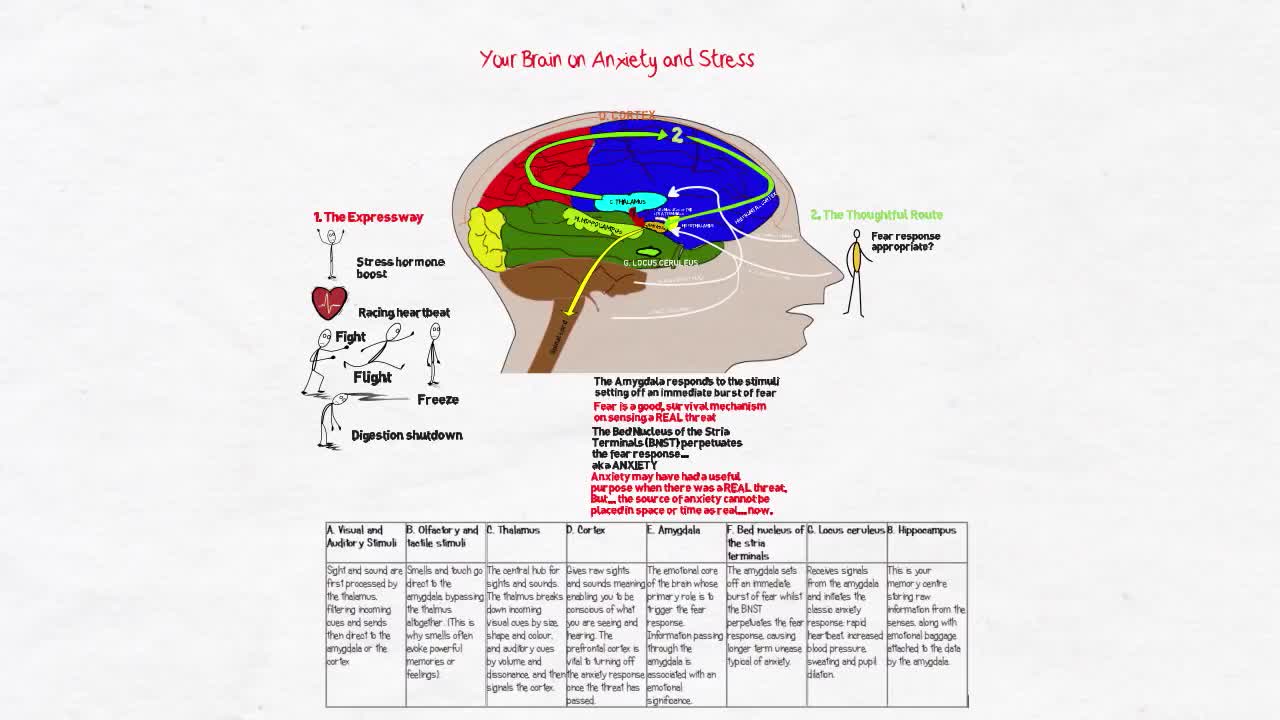Premium Only Content

Your Brain on Stress and Anxiety
Stress is the way our bodies and minds react to something which upsets our normal balance in life. Stress is how we feel and how our bodies react when we are fearful or anxious. Some level of stress has some upside to mind and body function to enable us to react in a positive way. Too much stress though, is both harmful to the body and our performance. How much is too much? Well, that depends... on you and how you respond.
It is essential to know how our brain responds to the stimuli which trigger an anxiety response so that you are equipped to deal appropriately with anxiety.
Let me highlight the key areas of your brain that are involved, and then I will explain what happens inside the brain.
The Thalamus is the central hub for sights and sounds. The thalamus breaks down incoming visual cues by size, shape and colour, and auditory cues by volume and dissonance, and then signals the cortex.
The cortex then gives raw sights and sounds meaning enabling you to be conscious of what you are seeing and hearing. And I'll mention here that the prefrontal cortex is vital to turning off the anxiety response once the threat has passed.
The amygdala is the emotional core of the brain whose primary role is to trigger the fear response. Information passing through the amygdala is associated with an emotional significance.
The bed nucleus of the stria terminals is particularly interesting when we discuss anxiety. While the amygdala sets off an immediate burst of fear whilst the BNST perpetuates the fear response, causing longer term unease typical of anxiety.
The locus ceruleus receives signals from the amygdala and initiates the classic anxiety response: rapid heartbeat, increased blood pressure, sweating and pupil dilation.
The hippocampus is your memory centre storing raw information from the senses, along with emotional baggage attached to the data by the amygdala.
Now we know these key parts, what happens when we are anxious, stressed or fearful?
Anxiety, stress and, of course, fear are triggered primarily through your senses:
Sight and sound are first processed by the thalamus, filtering incoming cues and sent directly to the amygdala or the cortex.
Smells and touch go directly to the amygdala, bypassing the thalamus altogether. (This is why smells often evoke powerful memories or feelings).
Any cues from your incoming senses that are associated with a threat in the amygdala (real or not, current or not) are immediately processed to trigger the fear response. This is the expressway. It happens before you consciously feel the fear.
The hippothalmus and pituitary gland cause the adrenal glands to pump out high levels of the stress hormone coritsol. Too much short circuits the cells of the hippocampus making it difficult to organize the memory of a trauma or stressful experience. Memories lose context and become fragmented.
The body's sympathetic nervous system shifts into overdrive causing the heart to beat faster, blood pressure to rise and the lungs hyperventilate. Perspiration increases and the skin's nerve endings tingle, causing goosebumps.
Your senses become hyper-alert, freezing you momentarily as you drink in every detail. Adrenaline floods to the muscles preparing you to fight or run away.
The brain shifts focus away from digestion to focus on potential dangers. Sometimes causing evacuation of the digestive tract thorough urination, defecation or vomiting. Heck, if you are about to be eaten as someone else's dinner why bother digesting your own?
Only after the fear response has been activated does the conscious mind kick in. Some sensory information, takes a more thoughtful route from the thalamus to the cortex. The cortex decides whether the sensory information warrants a fear response. If the fear is a genuine threat in space and time, the cortex signals the amygdala to continue being on alert.
Fear is a good, useful response essential to survival. However, anxiety is a fear of something that cannot be located in space and time.
Most often it is that indefinable something triggered initially by something real that you sense, that in itself is not threatening but it is associated with a fearful memory. And the bed nucleus of the stria terminals perpetuate the fear response. Anxiety is a real fear response for the individual feeling anxious. Anxiety can be debilitating for the sufferer.
Now that you know how anxiety happens in your brain, we can pay attention to how we can deliberately use our pre-frontal cortex to turn off an inappropriate anxiety response once a threat has passed.
Background Music: My Elegant Redemption by Tim McMorris. http://audiojungle.net/item/my-elegan...
I highly recommend that you also check out Lisa Feldman Barret's book on How Emotions are Made as this new research questions the assertions I make in the video (yes, I was probably wrong :-))
-
 LIVE
LIVE
Vigilant News Network
15 hours agoBUSTED: O’Keefe Exposes Secret Pentagon Plot to Sabotage Trump’s Return | The Daily Dose
1,346 watching -
 LIVE
LIVE
2 MIKES LIVE
12 hours agoTHE MIKE SCHWARTZ SHOW with DR. MICHAEL J SCHWARTZ 01-16-2025
256 watching -
 43:10
43:10
PMG
11 hours agoHannah Faulkner and Jeff Younger | Father fights for his son!
6.62K1 -
 1:24:14
1:24:14
Game On!
15 hours ago $5.00 earnedTaylor Swift SHOCKS Chief fans! Does NOT want Travis Kelce to retire!
39.3K9 -
 4:27
4:27
Reforge Gaming
14 hours agoTHIS will not save Ubisoft.
54K4 -
 7:35
7:35
Tactical Advisor
1 day agoNEW Springfield Prodigy Compact (FIRST LOOK)
87K7 -
 16:45
16:45
IsaacButterfield
1 day ago $7.09 earnedWoke TikToks Are DESTROYING The World
48.1K35 -
 1:09:27
1:09:27
State of the Second Podcast
19 hours agoThis is Why We Don’t Trust Politicians (ft. @stones2ndsense)
38.7K4 -
 10:19
10:19
Chrissy Clark
15 hours agoCNN’s BILLION Dollar Defamation Trial
41.6K11 -
 1:00:27
1:00:27
Trumpet Daily
23 hours ago $6.96 earnedCongress Humiliates Itself - Trumpet Daily | Jan. 15, 2025
41.9K16